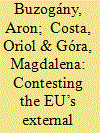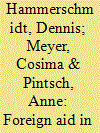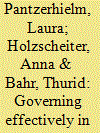|
|
|
Sort Order |
|
|
|
Items / Page
|
|
|
|
|
|
|
| Srl | Item |
| 1 |
ID:
187249


|
|
|
|
|
| Summary/Abstract |
This article analyses how populist parties in power contest the external democratization agenda within the European Union (EU)’s European Neighbourhood Policy (ENP). We present an analytical framework that conceptually unpacks both contestation and populism to argue that radical right, market liberal, regionalist and left-wing populist parties differ from each other concerning their views on external democratization. Our empirical focus is on the discursive strategies of Members of the European Parliament (MEPs) from PiS, Fidesz, Lega, Forza Italia and Movimento Cinque Stelle in European Parliament (EP) debates. The exploratory analysis reveals that populist actors rarely and selectively use the European arena for contesting democracy promotion. While an emphasis on stability and security in the neighbourhood prevails among all populist parties in our study, other considerations, such as migration policy, support for ethnic kin, suspicion towards Russia but also membership in the EP’s Party Groups inform the differences between the parties.
|
|
|
|
|
|
|
|
|
|
|
|
|
|
|
|
| 2 |
ID:
187247


|
|
|
|
|
| Summary/Abstract |
The credibility of democracy promotion provided by countries experiencing democratic backsliding has raised many doubts lately. The goal of this exploratory paper is to examine Poland’s efforts to promote democracy through foreign aid in Ukraine. I find that after winning the elections in 2015, the populist government in Poland started to transform democracy aid both at the level of development cooperation policy and in practice in Ukraine, one of the biggest beneficiaries of Polish aid. Rather than explicitly questioning or limiting aid as an instrument of democracy promotion, support for civil society and human rights has been reduced, and the involvement of Polish NGOs, especially those strongly committed to transferring democratic values abroad, declined. Such changes are perceived as another layer of Poland’s democratic backsliding rooted in the anti-pluralism of the Law and Justice party. Thus, this paper enriches the debate on populism by showing the latter’s effects on democracy promotion.
|
|
|
|
|
|
|
|
|
|
|
|
|
|
|
|
| 3 |
ID:
187246


|
|
|
|
|
| Summary/Abstract |
We know surprisingly little about the impact of democratic decline in the EU on foreign policy and on democracy promotion efforts in particular. We examine qualitative and quantitative changes in aid allocation for democracy promotion alongside declining levels of democracy in the EU and its members. Focusing on decision-makers’ perspectives, we explain these changes with strategic and constructivist approaches. We analyse multilateral and bilateral aid flows from the EU and its members to Central Asia with data from OECD and IATI from 2000 to 2018. We identify quantitative changes in aid promoting democracy in Central Asia, which can be partially attributed to the donors’ increasing challenges for democracy at home. While the overall aid levels remained stable, we also identify qualitative shifts in allocation patterns favouring government institutions rather than civil society organisations. Our findings address the impact of democratic decline on foreign policy towards non-democratic states outside the European neighbourhood.
|
|
|
|
|
|
|
|
|
|
|
|
|
|
|
|
| 4 |
ID:
187252


|
|
|
|
|
| Summary/Abstract |
The large-scale infrastructure projects being implemented in the East African Community (EAC) region portray signs of postmodernism especially as a reaction to and disenchantment with the development models adopted by African countries till the 1980s. Whereas the past model of high modernism focused on transforming national economies through implementation of large-scale infrastructure projects, the current thinking in the EAC focuses on fast tracking not only national development but also regional integration and realising Pan-African continental connectivity for sustainable development. The projects, however, manifest a competitive race amongst the partner states and subscribe to the African Renaissance mantra but push countries into debt entrapment and protracted dependency. Postmodern Pan-Africanism ought to incorporate ‘African content’ in the whole process of infrastructure development. The region’s transport corridors host infrastructure projects that show signs of a paradigm shift from the historical structure of exchange to an integrated regional mode of social and economic exchange. Infrastructure development is contextualised from a historical perspective that locates the viability of the Central, Northern and LAPSSET (Lamu Port–South Sudan–Ethiopia–Transport) Corridors in Pan-African connectivity, sustainable development and self-reliance.
|
|
|
|
|
|
|
|
|
|
|
|
|
|
|
|
| 5 |
ID:
187251


|
|
|
|
|
| Summary/Abstract |
This article looks at the linkages between export to the European Union (EU), export to china and human rights policies. The article argues that countries that export to the EU at high rates are more likely to converge towards its policies than countries that don’t export to the EU. The article also argues that the rise of China as a significant economic actor does not undermine this process. The article tests these arguments by analysing the links between human rights protection in the EU and in China, and export to the EU and to China, on the one hand, and human rights protection in all the countries for which there are data, on the other. The results indicate that countries’ human rights policies are positively associated with the EU’s human rights policies and this association is conditioned by countries’ levels of export to the EU. The results further indicate that export to China does not undermine this pattern. The article draws conceptual and policy implications.
|
|
|
|
|
|
|
|
|
|
|
|
|
|
|
|
| 6 |
ID:
187248


|
|
|
|
|
| Summary/Abstract |
Populist parties in governments are on the rise in many European countries that are also major donors of foreign aid. While the general political development of populism has attracted much scientific and media attention, there is little knowledge about how populist parties influence foreign aid spending. Since radical right-wing populism tends to over-prioritize domestic politics, populist radical right-wing governments are likely to reduce foreign aid spending. We argue that the larger the share of populist radical right parties in a government is, the less foreign aid is spent. We account for divisions of power by distinguishing between populist radical right parties in the legislative and executive branches of government. Analysing 25 OECD countries between 1990 − 2016 using generalized additive models, we find empirical support for our hypotheses. Our findings on foreign aid have implications for understanding the impact of populist radical right-wing parties on foreign policy making more broadly.
|
|
|
|
|
|
|
|
|
|
|
|
|
|
|
|
| 7 |
ID:
187253


|
|
|
|
|
| Summary/Abstract |
This article approaches the field of global health governance from the vantage point of shared discourses and norms on the good governance of governance amongst multiple international organisations (IOs). Conceptually, we introduce metagovernance norms as constitutive, reflexive beliefs concerned with institutional order and IO interactions in a given governance field. We argue that such norms are entangled with causal beliefs and problem perceptions that form part of contingent, contested repertoires of knowledge. Moreover, we illustrate how IO ‘expert’ groups form an authoritative subject position from which truth claims about governance are advanced. Empirically, we trace metagovernance norms in discourse(s) amongst eight health IOs since the 1970s. We show how metagovernance norms have been constructed around competing beliefs about governance ‘effectiveness’ and problem perceptions concerned with different forms of ‘complexity’. Our research demonstrates that discourses on institutional order in global health are shaped by metagovernance norms drawing on historically-specific knowledge repertoires.
|
|
|
|
|
|
|
|
|
|
|
|
|
|
|
|
| 8 |
ID:
187245


|
|
|
|
|
| Summary/Abstract |
International democracy promotion has been facing various challenges for a while. Among those are the decline of democracy and the rise of populism in donor countries. To date, however, there is little knowledge about their impact on democracy promotion. This article introduces a Special Issue that explores these challenges. After a general overview of the topic and consideration of the thematic focus of most contributions to the Special Issue, the introductory article elaborates in more detail on the relationship between populism and democracy promotion. Based on reviews of the debates about populism and democracy on the one hand and populism and foreign policy on the other hand, the article outlines three pathways through which populists may influence democracy promotion: (1) individual states, (2) international organizations and (3) civil society. In addition, the article summarizes the main findings of the contributions to the Special Issue and draws some general conclusions and perspectives for further research.
|
|
|
|
|
|
|
|
|
|
|
|
|
|
|
|
| 9 |
ID:
187250


|
|
|
|
|
| Summary/Abstract |
This article examines a new phase in democracy promotion in Central and Eastern European countries that recently have faced the process of shrinking civic space and democratic backsliding. In our case study, we analyse systematically the voices and strategies of Polish NGOs involved in democracy promotion at home and abroad as a response to these new challenges. Our empirical findings suggest that advocacy NGOs devoted to democratic quality and sustainability can continue their mission and promote or defend democracy, albeit with new incentives, strategies and goals that also depend on the existing political opportunity structures. The threat of shrinking civic space, paradoxically, has mobilized NGOs in Poland to strengthen their mission and resources, and seek wider support in society. This was possible due to new response strategies in three major areas of their operation: access, funding and networking. Understanding these actions has immediate policy implications, as it can help actors who are seeking to support democracy figure out how to play a more supportive role.
|
|
|
|
|
|
|
|
|
|
|
|
|
|
|
|
|
|
|
|
|